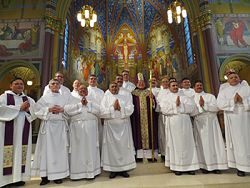Candidates to the diaconate ready for ordination
Friday, Jan. 20, 2017
SALT LAKE CITY — For more than four years, 15 men in the Diocese of Salt Lake City have endured harsh weather, long distances, family problems, health problems, and even the death of one of their own, but nothing has stopped them from following a special call that will result in their ordination to the diaconate on Jan. 27.
Among the deacon candidates is Guillermo Méndez López. He and his wife, Socorro, were involved with the marriage encounter program for more than 23 years. Through the program, which helps couples strengthen their marriage, they met lots of families, priests and deacons, and that collaboration triggered many invitations for Méndez to become a deacon.
However, “It was something that didn’t sound good for me at the moment. … I always have had the call to serve, but the diaconate didn’t sound like something for me back then,” said Méndez who, with his wife, began serving at St. Andrew Parish as soon as they arrived in Utah 11 years ago. They became very active in the parish but stopped being involved with marriage encounter.
“It wasn’t making us feel alive anymore,” Méndez explained. “When something like that happens, you have to move on and do something different. Serving means to give life, so we got very involved in all the parish ministries, to the point that we were asked to represent our parish on the [diocesan] Hispanic Commission.”
It was then that he realized the great needs in the faith community; the number of Hispanics in the Church was growing at a fast pace and a lot of help was needed, he said.
“One time in a meeting, Maria Cruz [Gray, director of the diocesan Hispanic Ministry] shared all those needs and she remarked on their urgency. It was there where I felt the call to the diaconate. It finally made sense to me,” Méndez said.
He started researching the program. At that time, a class of deacons had recently been ordained in the Diocese of Salt Lake City, and to Méndez’s surprise and joy, the first formation class for Spanish-speaking deacons was about to begin, so he enrolled.
His road through the program has been far from easy, but very satisfactory and full of learning, he said.
I thought that everything was going to go very smoothly, but it didn’t,” he said. “Following God is not easy. When you decide to get close to him, you really have to show and feel his love and love for him and for all he is. … We have been through many challenges.”
In fact, as soon as he accepted the call, his family started facing lots of challenges, he said.
“I started asking myself, ‘Why, now that I am dedicating my life to your service, Lord, why do you give us all these tests? ... But thanks be to God, and to my wife, we have overcome all of those challenges,” he said.
Through all that has passed, he has learned a lot, and from that he has found more motivation and more desire to be ordained as a deacon so that he is able to share and to better serve the community, he said.
“I feel that now I can relate to people who have hardships in their families. I feel very motivated to share that you can do it; with the help of Jesus and having him as the center of your life you can overcome any challenge. No matter what life puts in your way, with him by your side and in your heart everything will get better; without him, nothing is possible,” Méndez said.
Unlike with Méndez, the call to the diaconate was always present for his classmate José Fernando Montaño.
Upon arriving in the United States in 1987, the first thing Montaño did was get involved in the parish in Ephraim.
“My wife [Hirais] and I start serving as much as we could. I remember that there was a nun, Sister Brenda, who invited us to be more active in the parish,” Montaño said.
It was then that he and his wife decided to get married in the Church; up to then they were in a civil marriage.
“From then on we were lectors, communion ministers. … We really got involved in everything, and people were always telling me that I should be a deacon,” he said.
All those comments planted a seed in him, he said.
Service has always been a pillar in his life, but on one occasion he became so ill that he was incapacitated, he said. But “many people were by my side, supporting me, and that reinvigorated me and gave me lots of strength to fight to be able to keep on serving others,” he said.
Before entering the diocese’s diaconate formation program, Montaño was a member of the first group of Spanish-speaking lay ecclesial ministers in Utah, which was certified in 2014.
The diaconate formation program started while he was still training as a lay ecclesial minster. “At the beginning it was a challenge,” he said. “Time and distance and bearing the cost were very hard, but as time passed by, we got used to it, and instead of being a challenge we enjoyed it.”
As ordination to the diaconate gets closer, Montaño said that he feels a great joy, nervousness and a lot of emotion.
“This is something that I have been doing filled with faith. ... [I am] very willing to do my best to serve my brothers and sisters and the community,” said Montaño.
For questions, comments or to report inaccuracies on the website, please CLICK HERE.
© Copyright 2024 The Diocese of Salt Lake City. All rights reserved.
© Copyright 2024 The Diocese of Salt Lake City. All rights reserved.


Stay Connected With Us